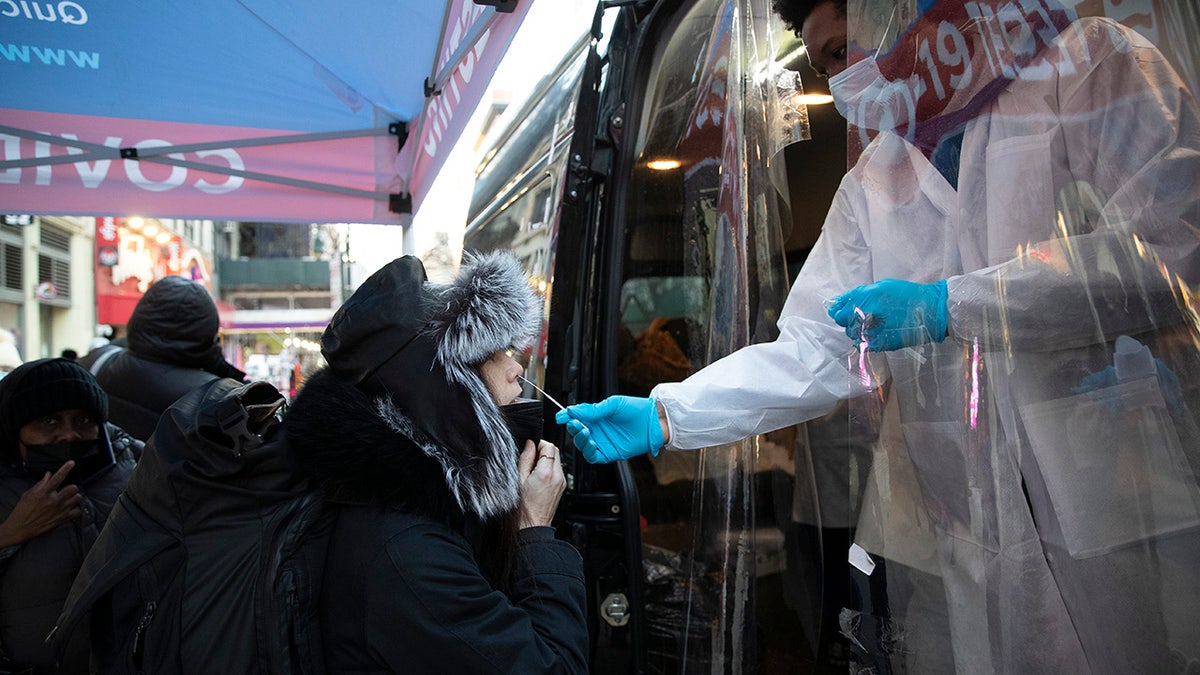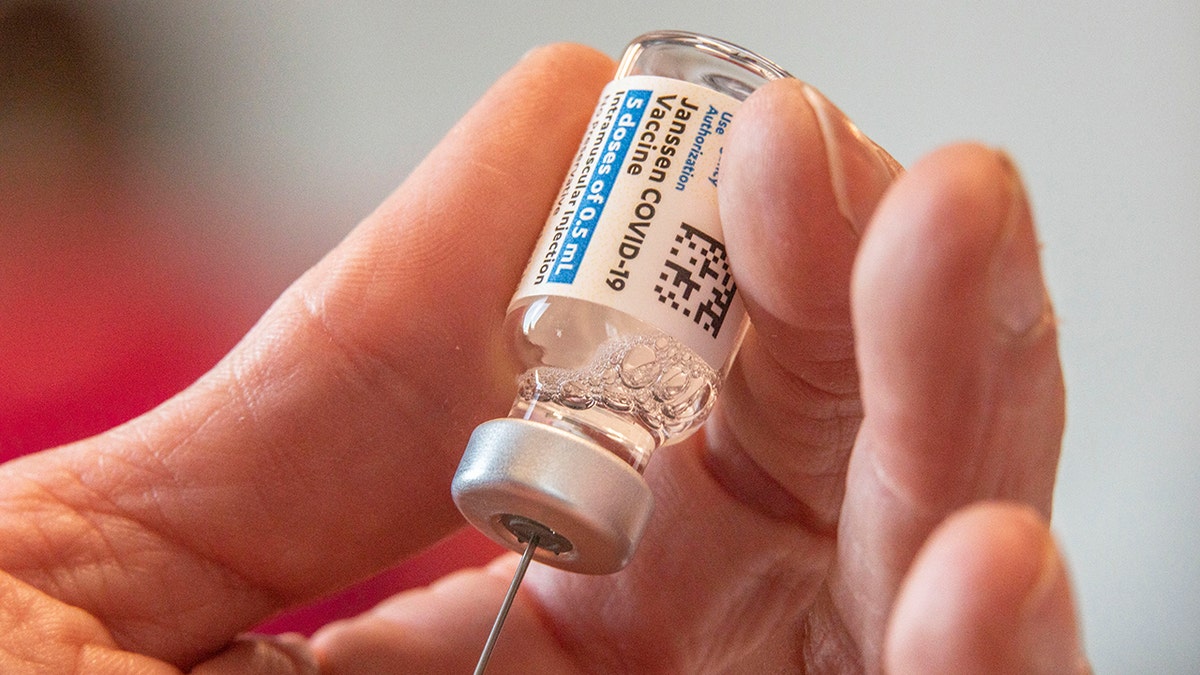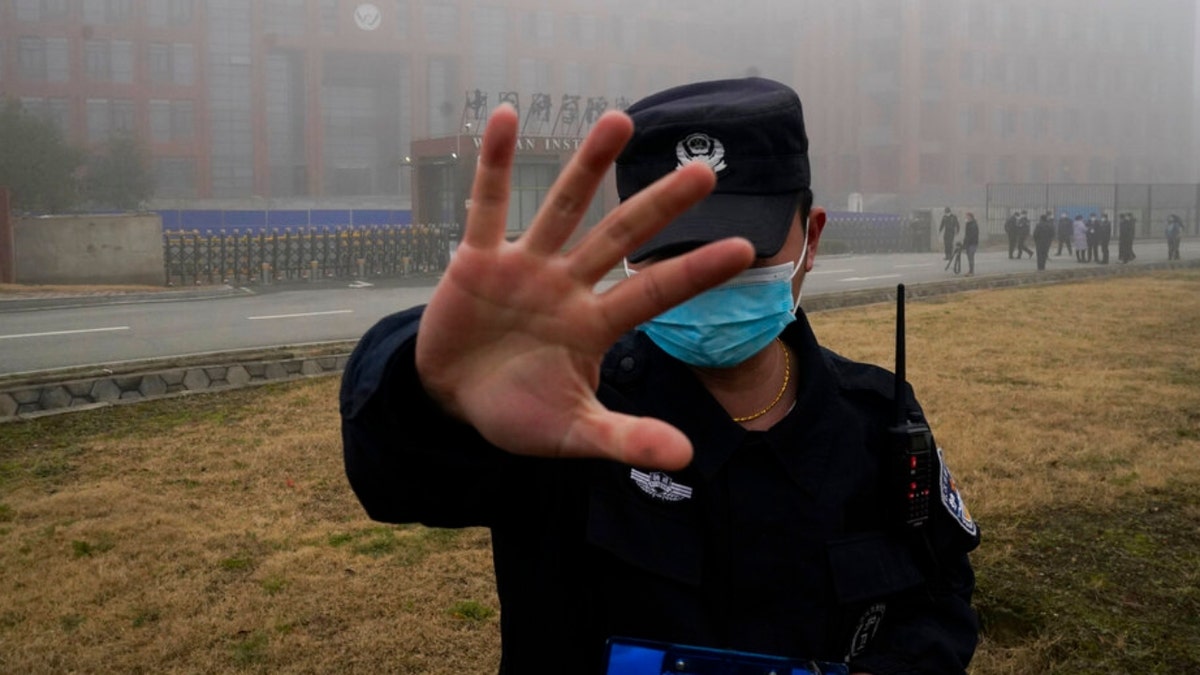Fox News Flash top headlines for March 8
Fox News Flash top headlines are here. Check out what's clicking on Foxnews.com.
In October 2017 – when most Americans never heard the word coronavirus, and SARS was, if anything, a distant memory – the U.S. government was planning joint research projects with China’s Wuhan Institute of Virology.
That’s when Gray Handley, associate director of the National Institute for Allergies and Infectious Diseases, forwarded the information to colleagues that said, "China’s Interest in the Global Virome Project Presents an Opportunity for Global Health Cooperation."

A woman gets tested at a mobile COVID-19 testing van. (Liao Pan/China News Service via Getty Images)
"U.S.-China collaboration on the Global Virome Project is an opportunity to lead innovation in science, collaborate with China, and potentially contribute to scientific breakthroughs," said the summary of the Global Virome Project in the email that was part of 92 pages obtained by the conservative group Judicial Watch in a Freedom of Information Act lawsuit with the National Institutes of Health.
The documents show that cooperation would include efforts in the coming years, such as U.S. government scientists providing training for Wuhan lab scientists in 2018. A key selling point was such a partnership would mean "pandemic preparedness" and "enable rapid detection" of viruses to prevent outbreaks. But by January 2020, U.S. health officials noted the Chinese government wasn’t being forthcoming about an outbreak, reluctant to say if it was related to the severe acute respiratory syndrome (SARS).
The 2019 novel coronavirus, better known as COVID-19, is also known as SARS-CoV-2.

Director of Nursing Crystal Jones, 52, loads syringes with the COVID-19 vaccine. (Stephen Zenner/SOPA Images/LightRocket via Getty Images)
That ambitious cooperation plan raised in October 2017 between two world powers would, among other things, ensure preparedness for a future pandemic, according to the documents.
NYC PARENTS PLAN TO SUE THE MAYOR OVER MASK MANDATES FOR YOUNG KIDS
"While U.S.-based NGOs and academics are likely to provide some leadership for the GVP, it will be important for the USG [U.S. government] to remain engaged in significant ways with the GVP, to ensure that U.S. interests are adequately reflected in this effort, which will facilitate the development of countermeasures against future threats (pandemic preparedness), and enable rapid detection of viral threats and increase the capacity to handle them," the summary of the Global Virome Project says.
The State Department was also in the loop.
By Feb. 23, 2018, another email exchange between officials at the U.S. Embassy in Beijing and the National Institutes of Health headquarters referred to a Chinese media account of research at the Wuhan Institute of Virology into how bats "harbor highly pathogenic viruses like Ebola, Marburg and SARS coronavirus but do not show clinical signs of disease."
An April 18, 2018, email from an official whose name is redacted, with the subject line "Cable on Wuhan Institute of Virology visit," refers to a cable that says, "China Virus Institute Welcomes More U.S. Cooperation on Global Health Security." The cable later adds, "China’s Wuhan Institute of Virology, a global leader of virus research, is a key partner for the United States in protecting global health security."
This message notes that U.S. scientists were training Wuhan scientists in 2018.
"[E]xperts from the NIH-supported P4 lab at the University of Texas Medical Branch have trained Wuhan lab technicians in lab management and maintenance, institute officials said," the cable continues. "NIH was a major funder, along with China’s National Science Foundation, of SARS research by the Wuhan Institute of Virology’s [redacted]."
The same cable further notes that a redacted word "with the EcoHealth Alliance (a New York City-based NGO that is working with the University of California Davis to manage the [redacted], plans to visit Wuhan to meet with Shi [Zhengli]."
EcoHealth Alliance is a nonprofit that received about $600,000 in U.S. tax dollars. The organization spent money studying coronavirus in bats at the Wuhan lab between 2014 and 2019. The NIH sent a letter to EcoHealth Alliance in July 2020, asking about its relationship with the Wuhan Institute of Virology.
Shi Zhengli is described elsewhere in the documents obtained by Judicial Watch as a scientist at the Wuhan Institute of Virology and the China country coordinator for the PREDICT project, which was a research project funded by the State Department’s U.S. Agency for International Development to fight disease. This project was described as a forerunner to the Global Virome Project.
In December 2019, the first known cases of COVID-19 emerged in China and began to spread. On Jan. 8, 2020, Dr. Ping Chen, a top NIAID official working in China, emailed senior NIAID colleagues, including Handley, with a subject line, "PRC Response to Pneumonia Cases Shows Increased Transparency Over Past Outbreaks, but Gaps in Epidemiological Data Remain."
"It has ruled out SARS, MERS, and flu. [Redacted] confirmed it is a viral infection," Chen told his colleagues.

A security person moves journalists away from the Wuhan Institute of Virology. (AP Photo/Ng Han Guan, File)
"While PRC officials have released timely and open general information about the outbreak, a lack of epidemiologic data … characteristics of infected individuals, and other basic epidemiologic information – hinders better risk assessment and response by public health officials," the Chen email says. "Authorities have also not released information on how they are defining a ‘case.’ Given these gaps in detailed information to-date, and lack of a final confirmed pathogen, the risk to the United States and global health is difficult to assess at this time."
SEATTLE TEACHERS UNION DEMANDS FORCED MASKING UNTIL MAY TO ENSURE ‘SENSE OF NORMALCY’
Neither the NIAID nor the NIH responded with a comment for this story, though the NIH did acknowledge receipt of the inquiry.
The State Department deferred to an October report by the intelligence community.
The intelligence community assessment says, "One IC element assesses with moderate confidence that the first human infection with SARS-CoV-2 most likely was the result of a laboratory-associated incident, probably involving experimentation, animal handling, or sampling by the Wuhan Institute of Virology."
But, the report says, "Most agencies also assess with low confidence that SARS-CoV-2 probably was not genetically engineered; however, two agencies believe there was not sufficient evidence to make an assessment either way."
CLICK HERE TO GET THE FOX NEWS APP
"China’s cooperation most likely would be needed to reach a conclusive assessment of the origins of COVID-19," the report says. "Beijing, however, continues to hinder the global investigation, resist sharing information, and blame other countries, including the United States."





